- Skip to main content
- Keyboard shortcuts for audio player

Killer whales are 'attacking' sailboats near Europe's coast. Scientists don't know why
Scott Neuman
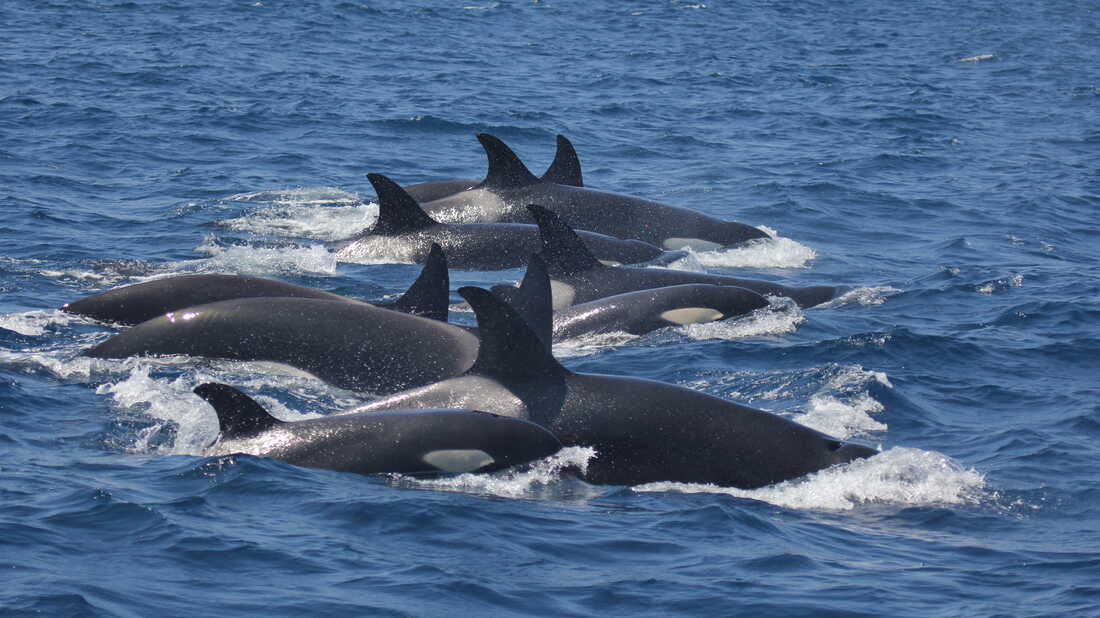
An orca pod seen in the Strait of Gibraltar in 2021. Renaud de Stephanis/CIRCE Conservación Information and Research hide caption
An orca pod seen in the Strait of Gibraltar in 2021.
Ester Kristine Storkson was asleep on her father's small yacht earlier this month, sailing off the coast of France, when she was violently awakened.
Scrambling on deck, she spotted several orcas, or killer whales, surrounding them. The steering wheel swung wildly. At one point, the 37-foot sailboat was pushed through 180 degrees, heading it in the opposite direction.
They were "ramming the boat," Storkson says. "They [hit] us repeatedly ... giving us the impression that it was a coordinated attack."
"I told my dad, 'I'm not thinking clearly, so you need to think for me,'" the 27-year-old Norwegian medical student says. "Thankfully, he is a very calm and centered person, and made me feel safe by gently talking about the situation."
After about 15 minutes, the orcas broke off, leaving father and daughter to assess the damage. They stuck a GoPro camera in the water, she says, and could see that "approximately three-quarters of [the rudder] was broken off, and some metal was bent."

A screen grab from a video of the encounter between a pod of orcas and the Storkson boat. Ester Kristine Storkson/ hide caption
A screen grab from a video of the encounter between a pod of orcas and the Storkson boat.
For any vessel, losing steering at sea is a serious matter and can be dangerous in adverse conditions and some sailboats have had to be towed into port after orcas destroyed their rudders. Fortunately, the Storksons had enough of their rudder left to limp into Brest, on the French coast, for repairs. But the incident temporarily derailed their plan to reach Madeira, off northwest Africa, part of an ambitious plan to sail around the world.
There is no record of an orca killing a human in the wild. Still, two boats were reportedly sunk by orcas off the coast of Portugal last month, in the worst such encounter since authorities have tracked them.
The incident involving the Storksons is an outlier, says Renaud de Stephanis, president and coordinator at CIRCE Conservación Information and Research, a cetacean research group based in Spain. It was farther north -- nowhere near the Strait of Gibraltar, nor the coast of Portugal or Spain, where other such reports have originated.
That is a conundrum. Up to now, scientists have assumed that only a few animals are involved in these encounters and that they are all from the same pod, de Stephanis says.
"I really don't understand what happened there," he acknowledges. "It's too far away. I mean, I don't think that [the orcas] would go up there for a couple of days and then come back."
These encounters — most scientists shun the word "attack" — have been getting the attention of sailors and scientists alike in the past two years, as their frequency seems to be increasing. Sailing magazines and websites have written about the phenomenon, noting that orcas seem to be especially attracted to a boat's rudder. A Facebook group , with more than 13,000 members, has sprung up to trade personal reports of boat-orca encounters and speculation on avoidance tactics. And, of course, there are no shortage of dramatic videos posted to YouTube.
Scientists don't know the reason, but they have some ideas
Scientists hypothesize that orcas like the water pressure produced by a boat's propeller. "What we think is that they're asking to have the propeller in the face," de Stephanis says. So, when they encounter a sailboat that isn't running its engine, "they get kind of frustrated and that's why they break the rudder."
Even so, that doesn't entirely explain an experience Martin Evans had last June when he was helping to deliver a sailboat from Ramsgate, England, to Greece.
About 25 miles off the coast of Spain, "just shy of entering the Strait of Gibraltar," Evans and his crew mates were under sail, but they were also running the boat's engine with the propeller being used to boost their speed.
As Evans was on watch, the steering wheel began moving so violently that he couldn't hold on, he says.
"I was like, 'Jesus, what's this?'" he recalls. "It was like a bus was moving it. ... I look to the side, and all of a sudden I could just see that familiar white and black of the killer whale."
Evans noticed "chunks of the rudder on the surface."
Jared Towers, the director of Bay Cetology, a research organization in British Columbia, says "there's something about moving parts ... that seem to stimulate them."
"Perhaps that's why they're focused on the rudders," he says.
The population of orcas along the Spanish and Portuguese coasts is small and de Stephanis believes that the damage to boats is being done by just a few juvenile males.
If so, they may simply outgrow the behavior, de Stephanis says. As the young males get older, they will need to help the pod hunt for food and will have less time for playing with sailboats.
"This is a game," he speculates. "When they ... have their own adult life, it will probably stop."

An orca calf, photographed in the Strait of Gibraltar, in 2021. Renaud de Stephanis/CIRCE Conservación Information and Research hide caption
An orca calf, photographed in the Strait of Gibraltar, in 2021.
Towers says such "games" tend to go in and out of fashion in orca society. For example, right now in a population he studies in the Pacific, "we have juvenile males who ... often interact with prawn and crab traps," he says. "That's just been a fad for a few years."
Back in the 1990s, for some orcas in the Pacific, something else was in vogue. "They'd kill fish and just swim around with this fish on their head," Towers says. "We just don't see that anymore."
Killer whales learn 'coordinated' attacks on sailboats, some observers say
Orcas may be teaching each other new ways to strike boats, observers say.
Orcas may be teaching others to attack boats following a spate of strikes on sailboats off the coast of Europe, some observers say.
Sailors have reported a series of "coordinated" attacks by a group of orcas, including a May 22 strike on a 26-foot vessel sailing off the coast of Cape Spartel, near the Strait of Gibraltar.
"[Six] orcas arrived, 2 adults very big, 4 smaller ones," sailor JP Derunes wrote in Orca Attack Reports , a Facebook group dedicated to flagging orca activity. "Both rudders destroyed and blocked … Boat to be hauled off later this week."
That attack followed a nighttime strike on May 4, when a Swiss yacht named Champagne, which was also sailing through the Strait of Gibraltar, was attacked by three orcas. They struck its rudder, eventually sinking it, reported Yacht , a German boating news outlet.
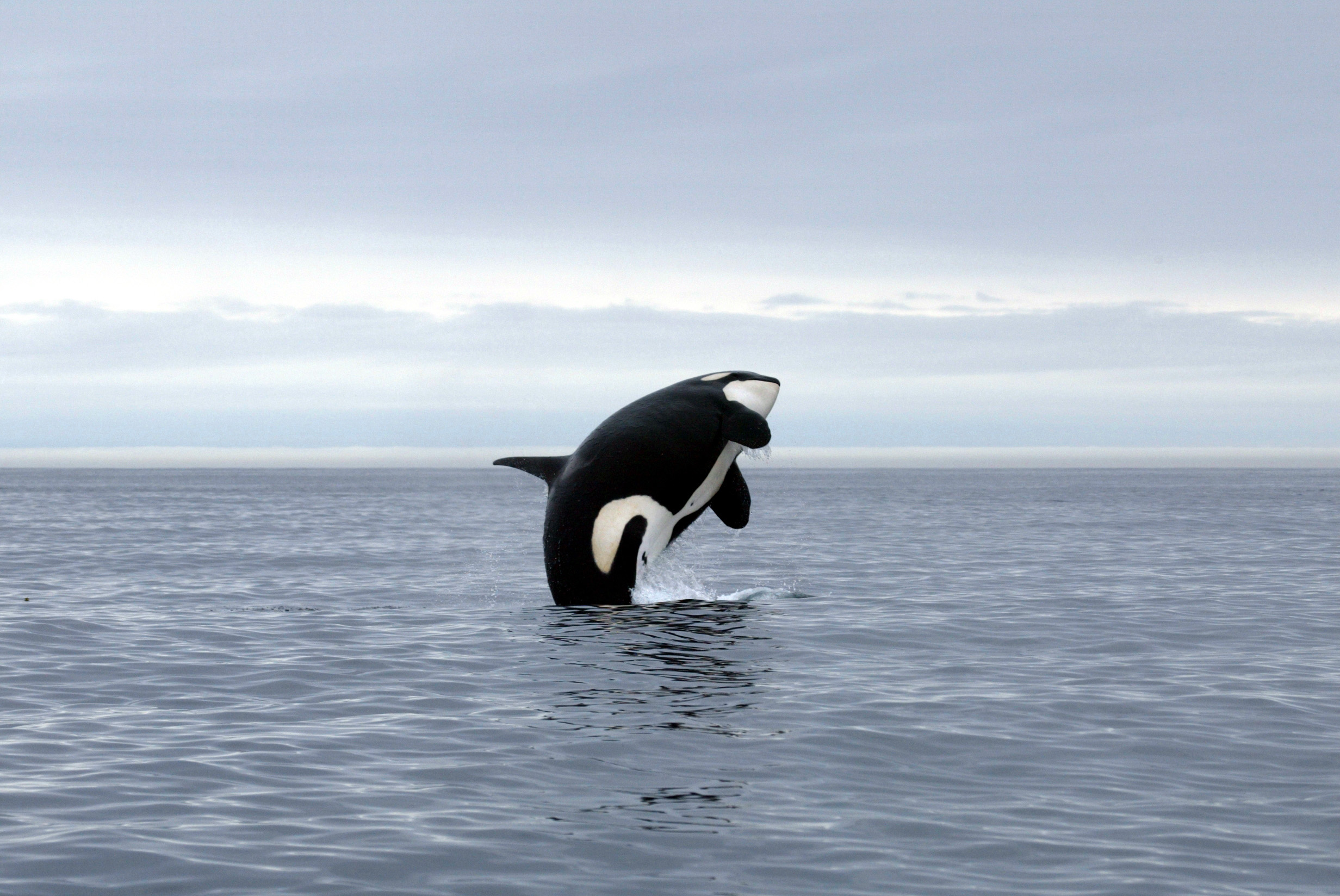
MORE: 21-foot killer whale dies after beaching itself on Florida coast
At least 15 human-orca incidents were recorded in 2020, the year in which the aggressive encounters are believed to have begun, according to a study published in the journal Marine Mammal Science . Many of those attacks included orcas biting or striking the rudders of sailboats.
No casualties appear to have been reported in the attacks.
Scientists said spikes in aggression may have been started by female orca whom scientists have named "White Gladis."
White Gladis is believed to have suffered a "critical moment of agony" such as a boat collision, which inflicted trauma on the orca, triggering a behavioural switch that other killer whales have learned to imitate.
The majority of orca-sailor encounters have been harmless.
"In more than 500 interaction events recorded since 2020 there are three sunken ships. We estimate that killer whales only touch one ship our of every hundred that sail through a location," Alfredo López Fernandez, a biologist at the University of Aviero, told Live Science .
According to a study in Biological Conservation, a peer-reviewed journal, "sophisticated learning abilities" have been found to exist in orcas, with imitation found to be particularly significant.
Related Topics
Top stories.

New York AG slams Trump bond filing as 'unreliable'
- Mar 20, 3:00 PM

Missing college student's stepdad opens up about family's difficult conversations

'We had to get our government funded': Johnson outlines plan to avert shutdown
- Mar 20, 12:19 PM

Kari Lake zeroes in on likely Senate race with Ruben Gallego
- 3 hours ago
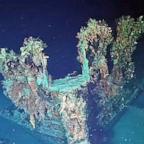
'Most valuable treasure': $17 billion Spanish shipwreck from 1708 to be recovered
- Mar 20, 3:05 PM
ABC News Live
24/7 coverage of breaking news and live events
Orcas sank three boats off the coast of Portugal, but don't call them 'killer' just yet
Three recent incidents of orcas seemingly attacking and sinking boats off the southwestern tip of Europe are drawing intense scrutiny over whether the animals deliberately swarmed the vessels and if they are learning the aggressive behavior from one another.
Encounters between orcas, or killer whales, and boats have been increasing since 2020, though no human injuries or deaths have been reported. In most cases, the whales have not sunk the boats.
The string of incidents since 2020 prompted one scientist in Portugal to say the attacks may indicate that the whales are intending to cause damage to sailing vessels. Others, however, are more skeptical, saying that while the behavior may be coordinated, it’s not necessarily coordinated aggression.
“I think it gets taken as aggression because it’s causing damage, but I don’t think we can say that the motivation is aggressive necessarily,” said Monika Wieland Shields, director of the Orca Behavior Institute, a nonprofit research organization based in Washington state.
At least 15 interactions between orcas and boats off the Iberian coast were reported in 2020, according to a study published last June in the journal Marine Mammal Science .
In November 2020, Portugal’s National Maritime Authority issued a statement alerting sailors about “curious behavior” among juvenile killer whales. The statement said the whales may be attracted to rudders and propellers and may try to approach boats.
The subsequent sinkings have caused more alarm.
The most recent encounter occurred on May 4 off the coast of Spain. Three orcas struck the rudder and side of a sailing yacht, causing it to eventually sink, as was reported earlier this month in a German publication called Yacht .
One theory put forward by Alfredo López Fernandez, a biologist at the University of Aveiro in Portugal, suggested that the aggression started from a female orca that was perhaps struck by a boat — a traumatic experience that caused her to start ramming sailing vessels. López Fernandez, who co-authored the June 2022 study published in Marine Mammal Science, told Live Science that other orcas may have then picked up that behavior through social learning, which whales have been known to exhibit.
But Shields said orcas have not historically been known to be aggressive toward humans, even when they were being hunted and placed in captivity.
“They’ve certainly had reason to engage in that kind of behavior,” she said. “There are places where they are shot at by fishermen, they’ve watched family members be taken from their groups into captivity in the ‘60s and ‘70s. And if something was going to motivate direct aggression, I would think something like that would have done it.”
Shields added that there are no clear instances of killer whales exhibiting what could be thought of as revenge behavior against humans.
She said the recent attacks on boats are likely more consistent with what’s known as “fad” behavior, which describes novel but temporary conduct from one whale that can be mimicked by others.
“It’s kind of a new behavior or game that one whale seems to come up with, and it seems to spread throughout the population — sometimes for a matter of weeks or months, or in some cases years — but then in a lot of cases it just goes away,” she said.
In the Pacific Northwest, for instance, Shields and her colleagues have observed fad behavior among Southern Resident killer whales who started carrying dead salmon around on their heads for a time before the behavior suddenly stopped.
Shields said the behavior of orcas off the Iberian coast may also be temporary.
“This feels like the same type of thing, where one whale played with a rudder and said: ‘Hey, this is a fun game. Do you want to try it?’ And it’s the current fad for that population of orcas,” she said.
While Shields did not dismiss the trauma response theory out of hand, she said it would be difficult to confirm without more direct evidence.
“We know their brains are wired to have really complex emotions, and so I think they could be capable of something like anger or revenge,” she said. “But again, it’s just not something that we’ve seen any examples of, and we’ve given them plenty of opportunities throughout the world to want to take revenge on us for various things. And they just choose not to.”
Denise Chow is a reporter for NBC News Science focused on general science and climate change.
Vengeance—or playtime? Why orcas are coordinating attacks against sailboats
The common denominator in dozens of incidents appears to be a mature female named White Gladis.

Orcas, or killer whales , are well known for their intelligence and for their remarkable hunting techniques: whether it’s turning great white sharks upside down or working cooperatively to take down large whales . And a population of orcas off the Iberian Peninsula has been gaining attention over the last three years—and causing angst among sailors—by attacking and even sinking boats in the area.
The first recorded attack occurred in the Strait of Gibraltar in May 2020, with dozens of cases recorded since then. Most of the incidents are remarkably consistent, generally involving a small group of whales attacking the rudders of small sailboats before breaking off and swimming away.
In June and November 2022, a pair of attacks caused two boats to sink; earlier this month, a badly damaged boat sank while it was being towed to shore .
Why the attacks may have started
A recent paper in the journal Marine Mammal Science found that the attacks involved nine whales in two groups: a trio, sometimes a quartet, of juveniles; and a mixed-age group led by a mature female named White Gladis. Given that White Gladis was the only mature female involved, the paper’s authors speculated that she had been involved in an accident with a boat and engaged in retributive behavior, which was then copied by the younger whales.
“When it started happening, I did think that maybe a female or her calf had been nicked by a propeller or rudder on a boat, because every single time they seem to go for the rudder. And it's all on sailboats,” says Dan Olsen, a field biologist with the North Gulf Oceanic Society in Alaska .
However, not everyone is convinced that the orcas’ actions have any malevolent intent. Notably, the orcas’ focus is very specifically on the boats; none have shown any interest in the people on board, even when those people have had to scramble into lifeboats when their vessels started sinking.
"I think it's just as reasonable to suggest that they're doing this because they can, because it's fun,” says Hanne Strager , co-founder of the Andenes Whale Center in Norway and author of the recently published book The Killer Whale Journals .
LIMITED TIME OFFER
Get a FREE tote featuring 1 of 7 ICONIC PLACES OF THE WORLD
A new form of play
Strager spoke to a biologist who was on board the boat that sunk in November, "and he said, ‘We didn't feel any aggression.’ And, to me, that's actually a strong testimony. Because I think when you are interacting regularly with animals, and you're used to reading them, you can feel an aggressive intent, and they didn't.”
If the orcas are indeed playing, it may suggest that, in time, the boat attacks could end when the whales get bored. Orca populations around the world have been observed engaging in a new behavior for no obvious reason than that they appear to enjoy it and then, just as suddenly, dropping it and moving onto something else. Orca researchers call these play routines “fads.”
Olsen, for example, has observed killer whales off Alaska playing with a piece of kelp for an hour: dragging it around on their fins, dropping it, circling back around and then picking it up in their teeth and swimming around with it some more. Strager has observed similar behaviors in orcas off the coast of Norway.
“For a while we saw them playing around with jellyfish,” she says. “They would swim with them on their snouts and would try to keep them on for as long as possible.”
You May Also Like

Orcas are killing porpoises—but not eating them. Why?

Were you on team orca? Why we wanted nature to 'fight back' in 2023
Single orca seen killing great white shark for first time ever
There's no benefit from this behavior, and the orcas were not eating the jellyfish, Strager notes.
“Sometimes we also see them whack little auks … small Arctic birds, they just lie on the surface of the sea to rest, and the orcas will come and whack them,” which she thinks is also a form of play.
Olsen questions whether we will ever truly understand the motivation behind the behavior, or whether we even really have the capacity to figure it out.
“The whale brain has been evolving separately for 50 million years,” Olsen says. “It’s hard to get a whale into an MRI, we don't even know which parts of the brain are dedicated to which activity. It's hard enough for us to explain behavior in humans and in primates that are closely related to us.”
Facing retaliation
Only this population has shown any interest in attacking boats, and it is a small one: the Marine Mammal Science paper cited an estimate of just 39 individuals.
The population in this region is under threat, says Strager, from tuna fishing, pollution, noise and, indeed, ship strikes.
“They are among the most polluted marine mammals in the world, so their breeding success is not good. It’s a very stressful environment for them,” she says.
And now, added to the existing stressors is the prospect of retaliation.
“Now they are becoming feared in the area,” notes Strager, “and there are reports of people suggesting you should pour diesel on top of them if they attack your boat, that you should put firecrackers in the water or ignite dynamite. I understand if people are afraid. But it's really a very dangerous situation for the killer whales.”
One local group, the Atlantic Orca Working Group , catalogues interactions between whales and boats so that sailors can learn which areas to avoid.
Related Topics
- ORCA (KILLER WHALE)
- ANIMAL WELFARE

Why are these orcas killing sharks and removing their livers?

Menopause is very rare among animals. Here’s why orcas go through it.

You are what you eat—and for orcas, that’s bad news

Did humpbacks try to save a seal from orcas? See for yourself.
- Paid Content
- Environment
History & Culture
- History & Culture
- History Magazine
- Mind, Body, Wonder
- Destination Guide
- Terms of Use
- Privacy Policy
- Your US State Privacy Rights
- Children's Online Privacy Policy
- Interest-Based Ads
- About Nielsen Measurement
- Do Not Sell or Share My Personal Information
- Nat Geo Home
- Attend a Live Event
- Book a Trip
- Inspire Your Kids
- Shop Nat Geo
- Visit the D.C. Museum
- Learn About Our Impact
- Support Our Mission
- Advertise With Us
- Customer Service
- Renew Subscription
- Manage Your Subscription
- Work at Nat Geo
- Sign Up for Our Newsletters
- Contribute to Protect the Planet
Copyright © 1996-2015 National Geographic Society Copyright © 2015-2024 National Geographic Partners, LLC. All rights reserved
- International edition
- Australia edition
- Europe edition
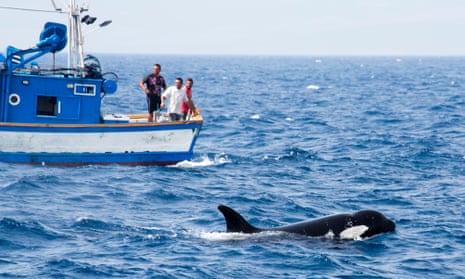
Scientists baffled by orcas ramming sailing boats near Spain and Portugal
From the Strait of Gibraltar to Galicia, orcas have been harassing yachts, damaging vessels and injuring crew
Full story: ‘I’ve never seen or heard of attacks’ – scientists baffled by orcas harassing boats
Scientists have been left baffled by incidents of orcas ramming sailing boats along the Spanish and Portuguese coasts.
In the last two months, from southern to northern Spain , sailors have sent distress calls after worrying encounters. Two boats lost part of their rudders, at least one crew member suffered bruising from the impact of the ramming, and several boats sustained serious damage.
The latest incident occurred on Friday afternoon just off A Coruña, on the northern coast of Spain. Halcyon Yachts was taking a 36ft boat to the UK when an orca rammed its stern at least 15 times, according to Pete Green, the company’s managing director. The boat lost steering and was towed into port to assess damage.
Around the same time there were radio warnings of orca sightings 70 miles south, at Vigo, near the site of at least two recent collisions. On 30 August, a French-flagged vessel radioed the coastguard to say it was “under attack” from killer whales. Later that day, a Spanish naval yacht, Mirfak , lost part of its rudder after an encounter with orcas under the stern.

Highly intelligent social mammals, orcas are the largest of the dolphin family. Researchers who study a small population in the Strait of Gibraltar say they are curious and it is normal for them to follow a boat closely, even to interact with the rudder, but never with the force suggested here.
The Spanish maritime authorities warned vessels to “keep a distance”. But reports from sailors around the strait throughout July and August suggest this may be difficult – at least one pod appears to be pursuing boats in behaviour that scientists agree is “highly unusual” and “concerning”. It is too early to understand what is going on, but it might indicate stress in a population that is endangered.
On 29 July, off Cape Trafalgar, Victoria Morris was crewing a 46ft delivery boat that was surrounded by nine orcas. The cetaceans rammed the hull for over an hour, spinning the boat 180 degrees, disabling the engine and breaking the rudder, as they communicated with loud whistling.
It felt, she said, “totally orchestrated”. Earlier that week, another boat in the area reported a 50-minute encounter; the skipper said the force of the ramming “nearly dislocated the helmsman’s shoulder”.
At 11.30 the previous night, British couple Beverly Harris and Kevin Large’s 40ft yacht was brought to a sudden halt, then spun several times; Harris felt the boat “raise a little”.
Earlier that evening, Nick Giles was motorsailing alone when he heard a horrific bang “like a sledgehammer”, saw his wheel “turning with incredible force”, disabling the steering as his 34ft Moody yacht spun 180 degrees. He felt the boat lift and said he was pushed around without steering for 15 minutes.
It is not known if all the encounters involve the same pod but it is probable. Dr Ruth Esteban, who has studied the Gibraltar orcas extensively, thinks it unlikely two groups would display such unusual behaviour.
Alfredo López, a biologist from the Coordinator for the Study of Marine Mammals in Galicia, said orcas made their way up the coast each September from the Gulf of Cadiz to chase tuna into the Bay of Biscay.
Morris’s sailing job was abandoned after the boat was lifted for repair, and she was diverted to another delivery. She is currently sailing down the Spanish coast and in the early hours of Friday a VHF radio warning came in. “All ships, all ships,” it began. “Orca just north of Vigo” – five miles from her location.
After her last experience, Morris is a little jumpy, but, as a science graduate with plans to study marine biology, she is concerned for this vulnerable population of orcas and interested to learn more. She’d just prefer not to get too close a view next time.
- Marine life
- The Observer
- Animal behaviour

Previous incident may have led Orcas to target boats, say experts

'They were having a real go': man tells of orca encounter off Spain

Spain bans yachts from stretch of sea after orcas damage boats

'I've never seen or heard of attacks': scientists baffled by orcas harassing boats

Boats off Spain damaged in orca encounters
Most viewed.
Killer whales wreck boat in latest attack off Spain
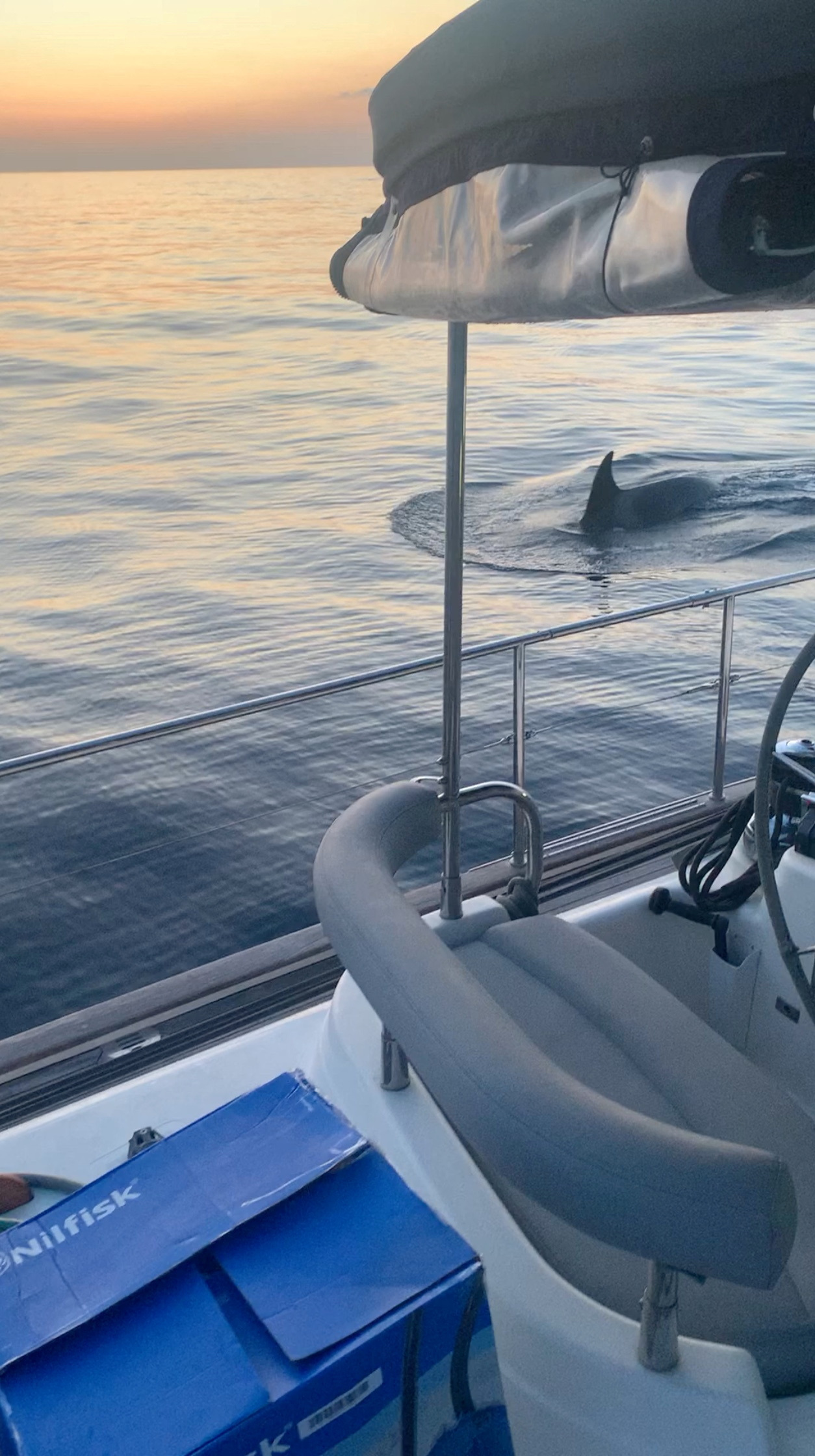
The Reuters Daily Briefing newsletter provides all the news you need to start your day. Sign up here.
Reporting by David Latona; Editing by Charlie Devereux and Barbara Lewis
Our Standards: The Thomson Reuters Trust Principles. , opens new tab

Mexico won't accept deportations from Texas, calls law 'dehumanizing'
Mexican President Andres Manuel Lopez Obrador sharply criticized a Texas law that would empower state law enforcement authorities to arrest people suspected of illegally crossing the U.S.-Mexico border, saying Mexico will not accept anyone repatriated by Texas.

Orcas have sunk 3 boats in Europe and appear to be teaching others to do the same. But why?
Scientists think a traumatized orca initiated the assault on boats after a "critical moment of agony" and that the behavior is spreading among the population through social learning.
Orcas have attacked and sunk a third boat off the Iberian coast of Europe, and experts now believe the behavior is being copied by the rest of the population.
Three orcas ( Orcinus orca ), also known as killer whales, struck the yacht on the night of May 4 in the Strait of Gibraltar, off the coast of Spain, and pierced the rudder. "There were two smaller and one larger orca," skipper Werner Schaufelberger told the German publication Yacht . "The little ones shook the rudder at the back while the big one repeatedly backed up and rammed the ship with full force from the side."
Schaufelberger said he saw the smaller orcas imitate the larger one. "The two little orcas observed the bigger one's technique and, with a slight run-up, they too slammed into the boat." Spanish coast guards rescued the crew and towed the boat to Barbate, but it sank at the port entrance.
Two days earlier, a pod of six orcas assailed another sailboat navigating the strait. Greg Blackburn, who was aboard the vessel, looked on as a mother orca appeared to teach her calf how to charge into the rudder. "It was definitely some form of education, teaching going on," Blackburn told 9news .
Reports of aggressive encounters with orcas off the Iberian coast began in May 2020 and are becoming more frequent, according to a study published June 2022 in the journal Marine Mammal Science . Assaults seem to be mainly directed at sailing boats and follow a clear pattern, with orcas approaching from the stern to strike the rudder, then losing interest once they have successfully stopped the boat.
"The reports of interactions have been continuous since 2020 in places where orcas are found, either in Galicia or in the Strait," said co-author Alfredo López Fernandez , a biologist at the University of Aveiro in Portugal and representative of the Grupo de Trabajo Orca Atlántica, or Atlantic Orca Working Group.
Related: Grisly new footage shows orcas attacking a great white shark and eating its liver
Sign up for the Live Science daily newsletter now
Get the world’s most fascinating discoveries delivered straight to your inbox.
Most encounters have been harmless, López Fernandez told Live Science in an email. "In more than 500 interaction events recorded since 2020 there are three sunken ships. We estimate that killer whales only touch one ship out of every hundred that sail through a location."
The spike in aggression towards boats is a recent phenomenon, López Fernandez said. Researchers think that a traumatic event may have triggered a change in the behavior of one orca, which the rest of the population has learned to imitate.
"The orcas are doing this on purpose, of course, we don't know the origin or the motivation, but defensive behavior based on trauma, as the origin of all this, gains more strength for us every day," López Fernandez said.
Experts suspect that a female orca they call White Gladis suffered a "critical moment of agony" — a collision with a boat or entrapment during illegal fishing — that flipped a behavioral switch. "That traumatized orca is the one that started this behavior of physical contact with the boat," López Fernandez said.
Orcas are social creatures that can easily learn and reproduce behaviors performed by others, according to the 2022 study. In the majority of reported cases , orcas have made a beeline for a boat's rudder and either bitten, bent or broken it.
"We do not interpret that the orcas are teaching the young, although the behavior has spread to the young vertically, simply by imitation, and later horizontally among them, because they consider it something important in their lives," López Fernandez said.
— 2 orcas slaughter 19 sharks in a single day in South Africa, eating their livers and leaving them to rot
— Orca males are burnouts who let their moms do all the hunting, surprising study finds
— Orcas and humpbacks clash in a violent melee of breaching and biting
Orcas appear to perceive the behavior as advantageous, despite the risk they run by slamming into moving boat structures, López Fernandez added. Since the abnormal interactions began in 2020, four orcas belonging to a subpopulation living in Iberian waters have died, although their deaths cannot be directly linked to encounters with boats.
The unusual behavior could also be playful or what researchers call a "fad" — a behavior initiated by one or two individuals and temporarily picked up by others before it’s abandoned. "They are incredibly curious and playful animals and so this might be more of a play thing as opposed to an aggressive thing," Deborah Giles , an orca researcher at the University of Washington and at the non-profit Wild Orca, told Live Science.
As the number of incidents grows, there is increased concern both for sailors and for the Iberian orca subpopulation, which is listed as critically endangered by the IUCN Red List . The last census, in 2011, recorded just 39 Iberian orcas, according to the 2022 study. "If this situation continues or intensifies, it could become a real concern for the mariners' safety and a conservation issue for this endangered subpopulation of killer whales," the researchers wrote.

Sascha is a U.K.-based trainee staff writer at Live Science. She holds a bachelor’s degree in biology from the University of Southampton in England and a master’s degree in science communication from Imperial College London. Her work has appeared in The Guardian and the health website Zoe. Besides writing, she enjoys playing tennis, bread-making and browsing second-hand shops for hidden gems.
Brutal footage shows orca mom and son team up to drown another pod's calf
Dying orca's final moments after 'desperate' effort to stay afloat captured in 1st of its kind footage
'Emergent gravity' could force us to rewrite the laws of physics
- ConvictedFelon https://en.m.wikipedia.org/wiki/Porphyrios_(whale) Reply
- Jesus Perhaps it's your exhaust and pollution, and noise. Perhaps frequencies disturb their consciousness. Reply
- slanagat If it were frequencies and exhaust I'd expect them to go after powerboats instead of sailboats. It's intriguing. Reply
- Jesus Perhaps, a neurotoxin. Perhaps, a cry for help. Reply
- schwingingatfences Orca see; orca do. They are intelligent. I'm relieved the focus is how to protect the orca as well as the mariners when the encounters occur. Reply
- puffrfeesh I think the orca can hear the humans interacting in a sail boat they don't like human noises because they aren't the same specie and are foreign to their habitat. Like territorial protection for their water. They are saying we are the largest and most aggressive and we eat white sharks livers just for a snack. Reply
- Nog How about the global warmers are bending the orca's minds with the vibrations from the idiotic windmills. Reply
admin said: Scientists think a traumatized orca initiated the assault on boats after a "critical moment of agony" and that the behavior is spreading among the population through social learning. Orcas have sunk 3 boats in Europe and appear to be teaching others to do the same. But why? : Read more
slanagat said: If it were frequencies and exhaust I'd expect them to go after powerboats instead of sailboats. It's intriguing.
- View All 14 Comments

Most Popular
By Richard Pallardy March 19, 2024
By Tom Metcalfe March 19, 2024
By Robert Lea March 19, 2024
By Jennifer Nalewicki March 19, 2024
By Brandon Specktor March 19, 2024
By Stephanie Pappas March 18, 2024
By Robert Lea March 18, 2024
By Kelly Carroll March 18, 2024
By Harry Baker March 18, 2024
By Elise Poore March 18, 2024
- 2 India's evolutionary past tied to huge migration 50,000 years ago and to now-extinct human relatives
- 3 Dying SpaceX rocket creates glowing, galaxy-like spiral in the middle of the Northern Lights
- 4 12 surprising facts about pi to chew on this Pi Day
- 5 1,900-year-old coins from Jewish revolt against the Romans discovered in the Judaen desert
- 2 12 surprising facts about pi to chew on this Pi Day
- 3 'Flow state' uncovered: We finally know what happens in the brain when you're 'in the zone'
- 4 James Webb telescope confirms there is something seriously wrong with our understanding of the universe
Why are killer whales going ‘Moby-Dick’ on yachts lately? Experts doubt it’s revenge
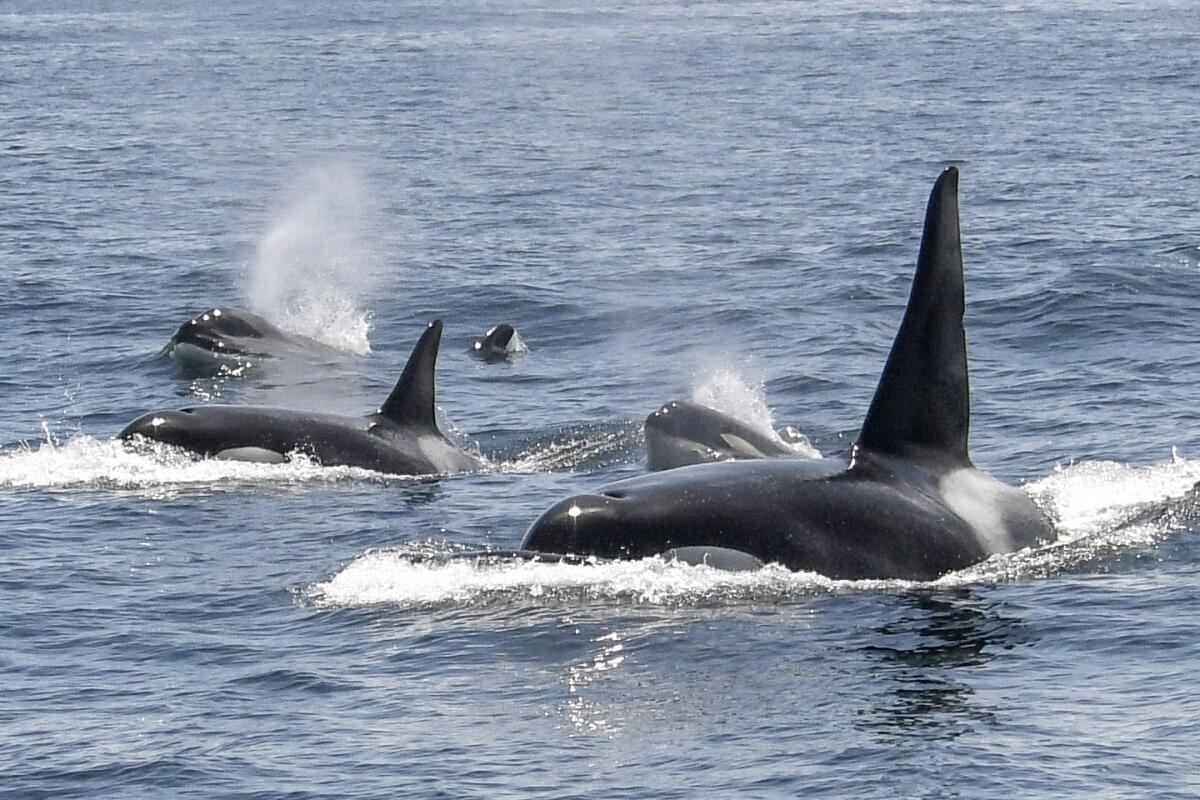
- Show more sharing options
- Copy Link URL Copied!
The attacks started suddenly and inexplicably in the spring of 2020 — pods of endangered killer whales began ramming yachts and fishing boats in European waters, pushing some off course and imperiling others.
Since then, there have been more than 500 reports of orca encounters off the Iberian Peninsula, the most recent occurring Thursday when a trio of whales rubbed against and bumped a racing sloop in the Strait of Gibraltar.
In most cases, the financial and structural damage has ranged from minimal to moderate: Boats have been spun and pushed, and rudders have been smashed and destroyed. Three vessels have been so badly mauled, they’ve sunk.
As the encounters continue, shaky video captured by thrilled and fearful seafarers has ignited a global internet sensation, while experts have struggled to explain the behavior and its timing. The seemingly militant whales have also won over a legion of adoring fans — many transfixed by the notion that the mammals are targeting rich people and exacting revenge for all the wrongs humanity has waged on their species and their ocean home.
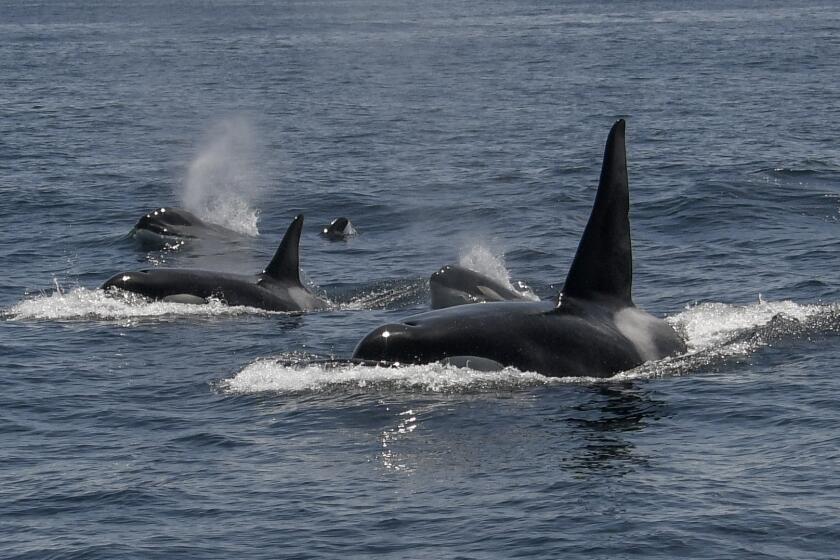
Two dozen killer whales spotted celebrating a hunt off the San Francisco coast
The unusually large group spotted near the Farallon Islands was possibly a meeting of six or seven families.
June 7, 2023
Others wonder if the unusually large pods of multi-ton cetaceans now appearing off the coasts of San Francisco , Monterey and Nantucket, Mass., may soon follow suit.
Despite such rampant speculation on social media, most killer whale scientists have offered a very different interpretation. The Moby-Dick “revenge” narrative for the behavior is highly unlikely, they say.
“That just doesn’t sit right with me,” said Deborah Giles, an orca researcher at the University of Washington in Seattle and director of Wild Orca, a Washington-based conservation research organization.
She noted that despite the long history of orcas being hunted by whalers — and more recently marine parks — these top ocean predators have typically demonstrated a lack of aggression toward humans. There are no verified instances of orcas killing humans in the wild. The only deaths have occurred in marine parks and aquariums, where animals taken from the wild and forced to perform for humans in small tanks have attacked their trainers.
“So, I just don’t really see it as an agonistic activity; I just don’t see it going down like that,” said Giles, who has studied killer whales in the Pacific Ocean, Puget Sound and the Salish Sea for nearly 20 years.
Instead, she thinks the animals are engaging with boats because the vessels are “either making an interesting vibration or sound, or maybe it’s the way the water moves past the keels that is intriguing to these animals.”
The scientific literature is rife with anecdotes and research showing high cognition, playfulness and sociality in the species known as Orcinus orca — and examples of what appear to be the cultural transmission of new behaviors, either via teaching or observation.
In 1987, a female orca in the Pacific waters off North America was spotted sporting a dead salmon on her head. Within weeks, individuals in two other pods also began wearing fish hats. The trend lasted a few months and fizzled out within a year.
In South Africa, the killing of white sharks appears to be growing in popularity among a resident group of killer whales in the waters near Cape Town; Giles has watched a local trend of “phocoenacide” — porpoise killing — grow among a group of whales off the San Juan Islands.
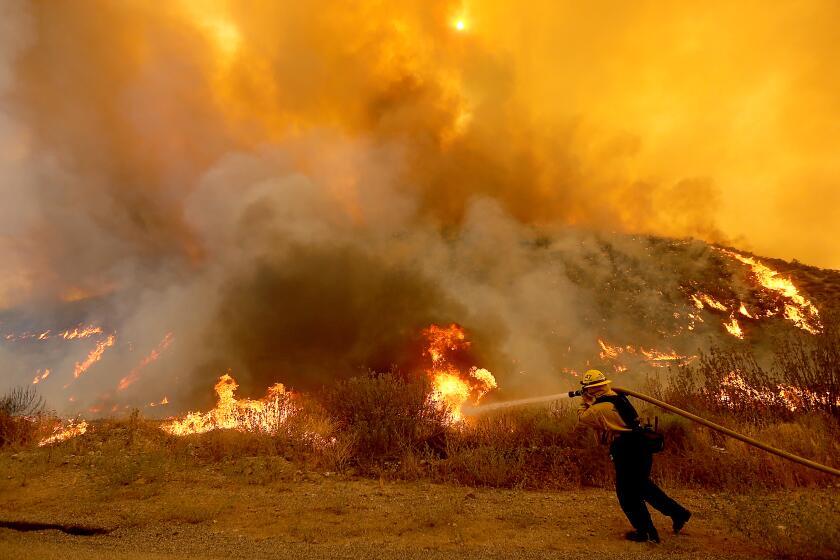
Wildfire burn areas in California are growing ever larger due to greenhouse gas emissions
Between 1996 and 2020, wildfire burn areas in California grew five times larger than in the 25 years prior. Scientists say climate change is to blame.
June 14, 2023
In both cases, the behavior does not appear to be for the purpose of feeding, Giles said. The orcas do not eat the dead animals. For instance, in the case of the porpoises, the killer whales played with them — bandying them about, sometimes surfing with them, other times carrying them on the orcas’ pectoral fins — until the porpoises drowned, at which point they were abandoned, she said.
“Fads” are not unique to orcas. Other animals, including primates and other cetaceans, have also been observed to adopt new behaviors, which then spread through a social group.
Susan Perry, a biological anthropologist at UCLA, has studied a population of capuchin monkeys in Costa Rica, where she has observed and demonstrated the cultural transmission of novel behaviors, including “eye poking” — in which one monkey slips its finger “knuckle deep” between the eyelid and the bottom of another monkey’s eyeball.
But the idea that the whales’ behavior is a response to trauma has gripped many — including the researchers who most closely study this population and first documented the behavior.
In a paper published last year , a team of Portuguese and Spanish researchers suggested the behavior seen in the Strait of Gibraltar orcas could have been triggered by a variety of causes, including trauma.
Alfredo López Fernandez, a killer whale researcher with GT Orca Atlántica, a Portuguese conservation research organization, said it is impossible to know how it started, or which whale or whales may have initially instigated the attacks.
He listed several adult females as the possible original perpetrators — which then taught or showed others how to participate.
There is White Gladis, which seems to be present in most of the attacks; Gladis Negra, which was observed to have injuries in 2020, possibly from a ship strike; and Gray Gladis, which in 2018 witnessed another whale get trapped in fishing gear.
Gladis is a name given to all orcas in the pod that interact with boats; it comes from Orca gladiator, an early nickname given to these boat-jouncing killer whales.
“All of this has to make us reflect on the fact that human activities, even in an indirect way, are the origin of this behavior,” he said.
For Cal Currier’s part, he thinks the whales are entertaining themselves.

Climate & Environment
Bay Area refinery fallout does not pose significant health risk, authorities say
Nearly six months after Martinez Refining Co. released hazardous materials, officials have announced reassuring soil test results.
June 9, 2023
On June 8, as the 17-year-old Palo Alto High School senior sailed through the strait with his father, James, 55, and brother, West, 19, their 30-foot sailboat was accosted and spun in circles.
The rudder was battered, and the trio had to be towed to shore in Spain. “They were playing,” Currier said.
He said that when they pulled in, they were told roughly 30 other boats were ahead of them in line for repairs; half were damaged by the killer whales. He said there were no bite marks on the rudder, and he did not sense aggression from the whales.
For Giles, the Washington killer whale researcher, her biggest concern is that the longer the whales continue this behavior, the more likely it is they’ll get injured or suffer retribution at the hands of humans.
She’s hoping authorities in the region will consider non-traumatic hazing techniques — such as instructing boats to play or make sounds that irritate the whales — to get them to stop. She said studies have shown orcas don’t like the calls of pilot whales and will generally swim away if they hear them. Loud banging sounds, such as hitting a large, metal oikomi pipe underwater, can also be effective.
“Anything that might irritate them, make them lose their interest or swim away,” Giles said.
Currier said he wasn’t too rattled by the whole experience — unlike his dad and brother, who were “scared for their lives.”
The trio have since sold the boat and intend to spend the rest of the vacation on dry land.
More to Read
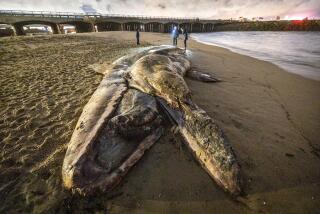
The gray whale die-off on West Coast is over, NOAA declares
March 19, 2024
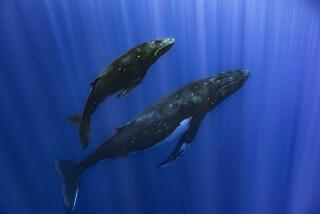
How do whales sing? Lab experiments suggest their voice boxes have a unique feature
Feb. 24, 2024
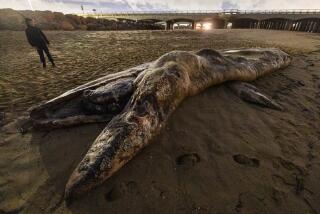
Decaying gray whale washes up on Orange County beach
Feb. 8, 2024

Susanne Rust is an award-winning investigative reporter specializing in environmental issues. She is based in the Bay Area.
More From the Los Angeles Times
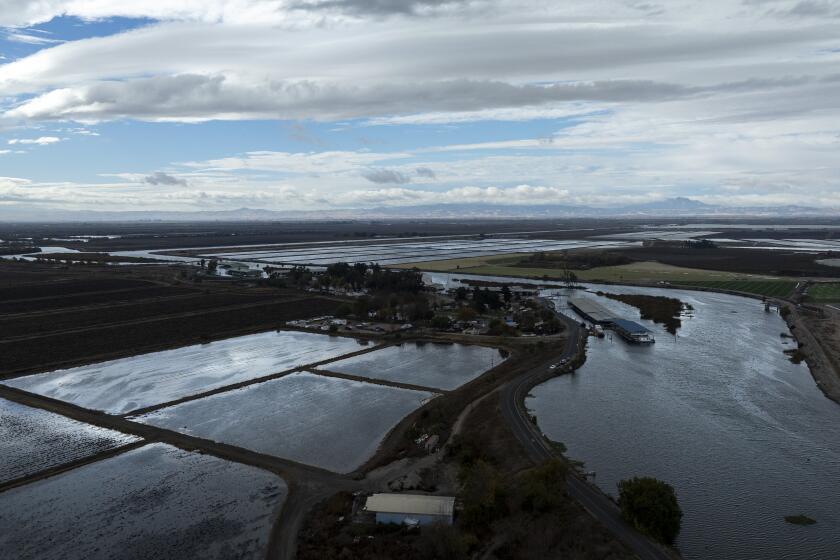
Court upholds state plan to require more water in California rivers
March 20, 2024
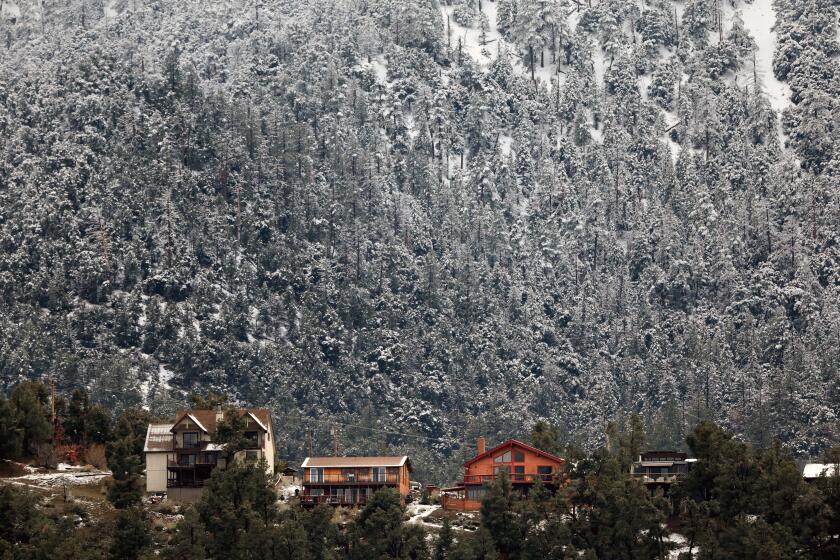
As hungry bears awaken from hibernation, a California mountain village braces for invasion
March 18, 2024
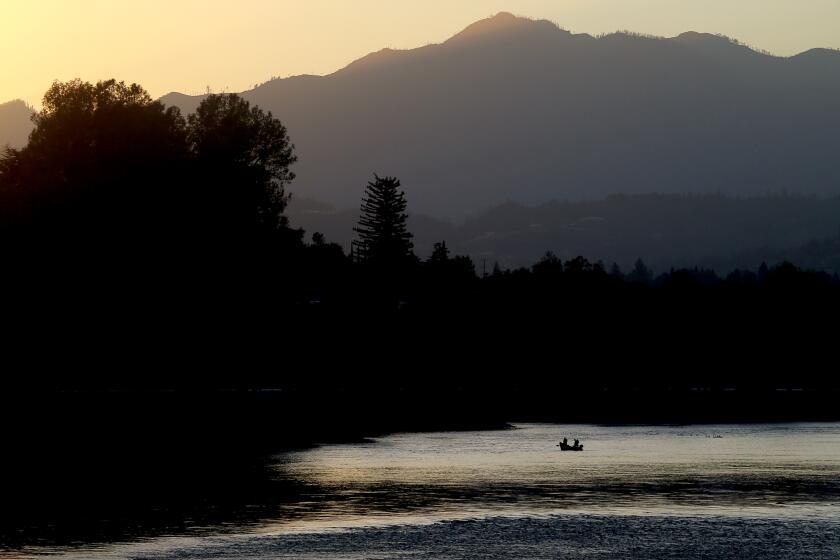
Mystery surrounds sudden increase in steelhead trout deaths near California water pumps
March 15, 2024
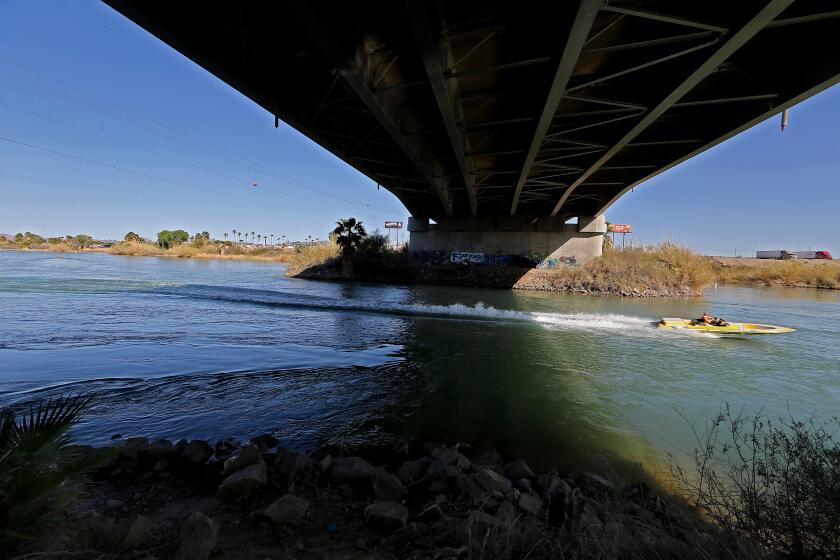
Presence of parasite that’s deadly for dogs now confirmed in California: Signs to watch for
March 14, 2024
Killer whales attacking sailboats: Revenge or something else going on?
Lately, all the news outlets are reporting about killer whales attacking sailboats off the Iberian coast near the Strait of Gibraltar, where the Atlantic Ocean meets the Mediterranean Sea.
According to a recent report by National Public Radio and a study in Marine Mammal Science (June 2022), the attacks in this area are steadily increasing, with more than 500 attacks since 2020 and reports of at least three boats sunk by this behavior. This has intrigued me. Not being an expert on whales, I decided to do a little research.
Killer whales, or orcas , are members of the Delphinidae family. They are toothed whales very closely related to dolphins and porpoises. These whales have a reputation for hunting and eating schools of fish and marine mammals. According to the National Oceanic and Atmospheric Administration, the whales have very sophisticated hunting techniques, hunting in groups or pods, similar to packs of wolves.
They live in small pods of up to 20 animals, usually all related to one another. They live, travel and hunt together. Pods, at times, will join for hunting or mating.
More: Aquarium scientists spot four killer whales in rare sighting in New England waters
The whales communicate through varied sounds and clicks. Each maternally related pod has distinct sounds that identify them from other groups. The whales learn hunting techniques within their pod, which seem to be passed down from generation to generation. Scientists have tried to categorize the pods over the year by what they eat or how they eat. Some even feel pods could be classified as a separate species or subspecies. I am not so sure about this. The DNA of many of the pods is slightly different from other pods, which seems to indicate that they are not interbreeding. More recently, it has been observed that the pods of orcas in the Atlantic are eating a more varied diet, possibly due to changing availability. This means they are varying their hunting techniques depending on what prey they are consuming.
So why are the orcas in the northeast Atlantic attacking sailing vessels, particularly the rudders of sailboats? Most captains have a similar story to tell. They are approached by a pod of killer whales who begin by ramming the vessel and then take turns ripping the rudder apart. Most of the captains have reported seeing an older female overseeing the process. There have been reports that the whales are becoming stealthier and attacking without making any sounds prior to the attack. Most of the vessels are left unable to sail back to port and have had to be towed in by other boats.
Coddock? How a new cod-haddock-like fish caught the attention of scientists
Why this is happening is a mystery to scientists, but most of them agree that it appears to be a learned response. The main theories are either one of the animals was previously injured or killed by a sailboat or other vessel rudder, or that something has triggered this response like noise, increased boat traffic, or something else irritating the whales. Most scientists agree that this response is being passed on as a hunting technique.
This to me, as a scientist, is a most amazing set of circumstances. We may never know why these whales have started attacking the sailing vessels, but we should take note and keep a watchful eye on this behavior.
Orcas are highly-intelligent animals, and if one pod has developed an aberrant behavior, other orcas may be able to develop their own behaviors. As humans, we need to understand if our activity in the ocean is having negative consequences and what activities might be causing this response in the whales.
Keep in mind that the Strait of Gibraltar is an area of extremely high boating and shipping traffic. The whales may just be upset that something about the sailboat rudder is disrupting their ability to hunt their prey or are disrupting the schools of fish they are following.
Killer whales are not common in the Gulf of Maine, but there is one who frequents New England to Nova Scotia. His name is Old Thom. He is a male who seems to like traversing long distances by himself.
Just last week, however, there was a pod of at least four orcas spotted off Nantucket by spotter planes from the New England Aquarium.
Killer whales were seen in the Gulf of Maine last summer also. This could be a sign that they are expanding their range or just following the food. The whales have been seen in the summer chasing bluefin tuna. We must remember that these animals are apex predators and extremely good at what they do. The whales are able to work together to capture their prey. We seem to have an unlimited food source of seals along our coast now. They could be a tasty morsel!
Although this may seem like a perfect script for a horror movie, we need to keep in mind that, so far, this is only one small pod of whales on the other side of the Atlantic. We can only hope this type of destructive behavior doesn’t spread to other pods.
Ellen Goethel is a marine biologist and the owner of Explore the Ocean World at 367 Ocean Blvd. at Hampton Beach.
Watch CBS News
Killer whales sink yacht after 45-minute attack, Polish tour company says
By Emily Mae Czachor
November 6, 2023 / 9:58 AM EST / CBS News
A group of orcas managed to sink a yacht off the coast of Morocco last week, after its 45-minute attack on the vessel caused irreparable damage, a Polish tour company said.
The incident happened Tuesday, Oct. 31, as a crew with the boat touring group sailed through the Strait of Gibraltar. The narrow waterway bridges the Mediterranean Sea and the Atlantic Ocean, which separates the southern tip of Europe from northern Africa.
A pod of orcas, colloquially called killer whales, approached the yacht and "hit the steering fin for 45 minutes, causing major damage and leakage," the tour agency Morskie Mile, which is based in Warsaw and operated the yacht, wrote on Facebook in a translated post.
Although its captain and crew were assisted by a search-and-rescue team as well as the Moroccan Navy, the yacht could not be salvaged. It sank near the entrance to the port of Tanger-Med, a major complex of ports some 30 miles northeast of Tangier along the Strait of Gibraltar. None of the crew members were harmed, said the Polish tour agency, adding that those on board the sunken yacht were already safe and in Spain by the time their Facebook post went live.
"This yacht was the most wonderful thing in maritime sailing for all of us. Longtime friendships formed on board," wrote Morskie Mile. The company said it was involved in other upcoming cruises in the Canary Islands and would work to make sure those boat trips went ahead as planned.
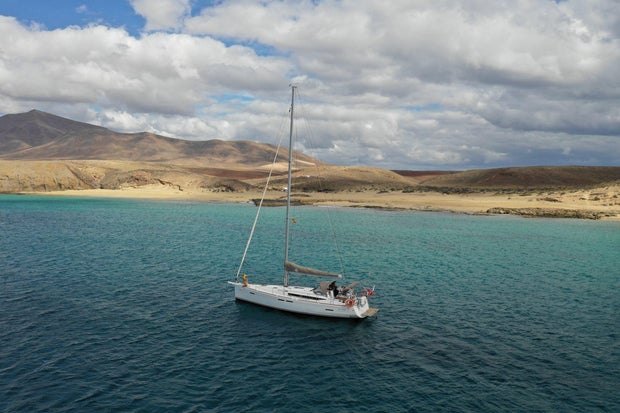
Last week's incident in the Strait of Gibraltar was not the first of its kind. Reported attacks by killer whales that seem to be trying deliberately to capsize boats off the coast of Spain and Portugal have more than tripled over the last two years, according to data released in the spring by the research group GTOA, which studies orcas around Gibraltar.
"Nobody knows why this is happening," Andrew W. Trites, professor and director of Marine Mammal Research at the University of British Columbia, told CBS News in May. "My idea, or what anyone would give you, is informed speculation. It is a total mystery, unprecedented."
GTOA recorded 52 maritime interactions with orcas between the Strait of Gibraltar and Galicia, a coastal province in northwestern Spain, between July and November 2020. The incidents picked up in the years that followed, with 197 interactions recorded in 2021 and 207 recorded in 2022, GTOA said, noting that the interactions mainly affected sailboats.
Then, in June of this year, one of two sailing teams involved in an international race around the world reported a frightening confrontation involving multiple orcas as they traveled through the Atlantic Ocean to the west of Gibraltar. The teams, which were competing in The Ocean Race, said the orcas did not damage their boats or harm crews, but recalled the sea creatures pushing up against and, in one instance, ramming into one of the boats. The orcas also nudged and bit the rudders, one crew member said.
Caitlin O'Kane and Kerry Breen contributed to this report.
Emily Mae Czachor is a reporter and news editor at CBSNews.com. She covers breaking news, often focusing on crime and extreme weather. Emily Mae has previously written for outlets including the Los Angeles Times, BuzzFeed and Newsweek.
More from CBS News
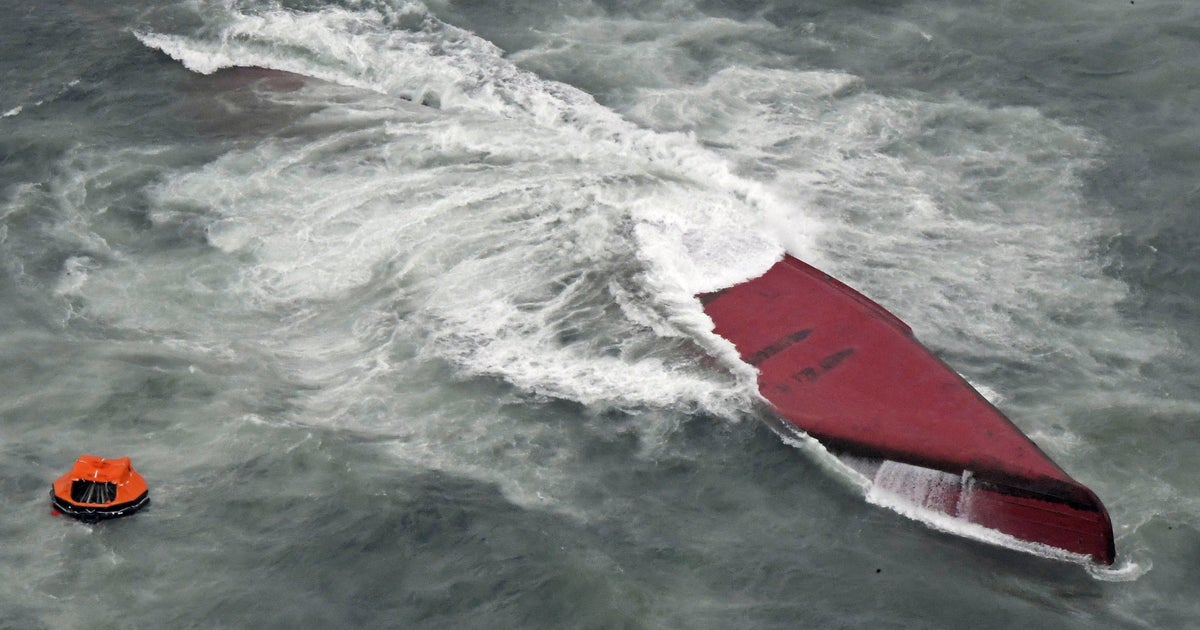
At least 8 killed as chemical tanker capsizes off Japan's coast

Blinken says Gaza's entire population facing "acute food insecurity"

Forced sale of TikTok "absolutely could" happen before election, Gallagher says

3 juveniles, including 2 tweens, arrested for alleged Houston bank robbery
Are the orcas out to get us? What to know about recent attacks.
An orca might bump your boat or even spin it around. but don’t worry. you don’t need to cancel that whale watching trip..

From spinning boats to breaking rudders, a group of feisty orcas has been causing chaos off the coast of Spain.
In the past few years, boaters have reported more than 500 interactions with orcas, which can include benign encounters such as bumping the vessel or a curious orca swimming around the boat. But in about 250 cases, the Orcas have done actual damage, including serious damage to about 60 vessels and the sinking of three boats, according to John Burbeck, a member of the Cruising Association, an organization that supports sailors.
We asked whale experts to help explain this odd behavior, the risks posed to humans and whether we should cancel plans to go whale watching. Here’s what they had to say.
Read more from Well+Being
Well+Being shares news and advice for living well every day. Sign up for our newsletter to get tips directly in your inbox.
Vitamin B12 for fatigue has no proven benefit unless you have a deficiency that causes anemia.
Flashes, shimmers and blind spots: Here’s what migraine aura looks like.
Sparkling water is a better choice for your teeth than most popular beverages.
You can help your brain form healthy habits and break the bad ones.
Our 7 best tips to build an exercise habit .

Sperm whales drop 'bubble of poo' off WA to prevent orca attack in rarely recorded encounter
Sperm whales off Western Australia's southern coast have successfully defended themselves from an attack by a pod of orca by defecating at will, creating a "cloud of diarrhoea".
The rare defence mechanism thwarted the likely fatal attack at the Bremer Canyon — a marine life hotspot about 50 kilometres off the coast between Albany and Hopetoun — on Tuesday.
An orca pod attempted to hunt the pod of giant sperm whales until the latter unleashed its unique defence.
Marine biologist Jennah Tucker, who works on board Naturalise Charters tour boat, witnessed the incident.
Defensive defecation saves ocean giants
Ms Tucker said sperm whales had developed the intriguing and effective defence strategy over many years.
"It's called defensive defecation," she said.
The sperm whales defecate and swish their tails around through it to fend off or confuse predators.
"And because sperm whale's diet consists mostly of squid, they actually have this really reddish coloured poo," she said.
"And it seems like it actually did work in this case".
High seas battle between orca, whales
In this case, the sperm whales tightly huddled in a circular formation, heads to the centre and fanning their tails out.
"This is called a rosette, another defensive mechanism they use when they're under attack," she said.
Ms Tucker said the sperm whales were really distressed and exhausted.
"They were sort of poking their heads out of the water and letting out these huge heaving breaths," she said.
'Solemn mood'
Then a massive dark bubble rose to the surface. It was initially thought to be a blood bubble from an attack.
"And everything kind of went quiet and there was very solemn sort of mood on the deck of the boat because we thought they'd potentially taken out a calf, as one of the sperm whales did look significantly smaller than the others," Ms Tucker said.
"But then the killer whales all just moved off really suddenly".
It was not until the scientists on board reviewed the footage they realised it was faeces released by the sperm whales.
"We realised that the big dark bubble we'd seen and assumed might have been blood was actually poo," Ms Tucker said.
Ms Tucker said the emergency evacuation saved the creature's lives.
"It was like the orcas said, no, not worth our time, everyone move out," she said.
Orca attacks on sperm whales rare
It is rare for orcas to try to take down sperm whales, with only a few documented cases around the world.
"Sperm whales are considered an apex predator, and historically, it was thought that they were pretty much immune to killer whale attacks," Ms Tucker said.
"But there have been a few accounts now of successful predations on sperm whales, but it is extremely rare globally and historically
"It's actually pretty adventurous for orcas to try to take on sperm whales. They're punching above their weight."
Tourists and scientists flock to the area to witness orcas, often in pods of more than 50, hunt animals including a first ever recorded blue whale attack.
"We have seen the Bremer orcas do some pretty crazy things; they don't shy away from too much, "Ms Tucker said.
This attempt comes as observers in Bremer Bay report they have witnessed the most orca predations for this March than any other March— six in the past two weeks, nine for the month.
The first blue whale of the season was also spotted on Wednesday.
ABC Great Southern — local news in your inbox
- X (formerly Twitter)
Related Stories
Awestruck sightseers watch on as orca pod chases blue whale off bremer bay.
Bremer Bay orcas 'healthiest on the globe' as numbers boom off Western Australia
Japanese photographer living out dream job snapping orcas off southern Australia
- Animals and Nature
- Mammals - Whales
- Marine Parks
March 1, 2024
A Lone Orca Killed a Great White Shark in First Attack of Its Kind to Be Documented in Detail
For the first time, scientists make detailed observations of a single killer whale killing a great white shark and then eating its liver
By Stephanie Pappas
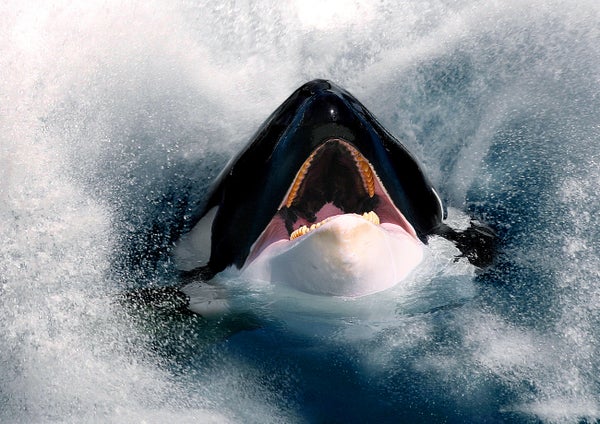
A killer whale breaches the sea surface.
blickwinkel/Alamy Stock Photo
An infamous orca killed a great white shark by itself last year in South Africa and devoured the shark’s nutritious liver. It’s the first time researchers have made detailed observations of a killer whale preying on a great white shark alone, and the entire attack took less than two minutes.
“While killer whales can hunt large prey individually, this is the first documented instance in South Africa involving white sharks as prey,” says Alison Towner, a senior white shark biologist at the conservation and ecotourism organization Marine Dynamics.* “The surprising element was how quickly the killer whale immobilized and consumed the liver of the shark.”
The killer whale involved is well known in Mossel Bay, South Africa. Dubbed “Starboard” for his bent-to-the-right dorsal fin, this orca has been observed preying on white sharks in the area with its travel partner, “Port,” for years. (Port, another male, has a dorsal fin that bends to the left.)
On supporting science journalism
If you're enjoying this article, consider supporting our award-winning journalism by subscribing . By purchasing a subscription you are helping to ensure the future of impactful stories about the discoveries and ideas shaping our world today.
The researchers aren’t sure why Starboard went after the shark on his own or how frequently this behavior occurs, they report today in the African Journal of Marine Science . Before now Port and Starboard had always been observed working together in attacking white sharks, sometimes leading groups of up to six total orcas in drawn-out pack hunts. Towner and her colleagues previously reported that these hunts usually end in a feast of shark liver for the predatory whales .
But on the afternoon of June 18, 2023, when onshore observers spotted the two orcas, that wasn’t the case. The researchers studying the pair launched a small vessel and followed them. In the killer whales’ wake, they discovered a slick of gore on the ocean surface, accompanied by the smell of shark liver. “Shark liver has a unique and recognizable scent—oily,” Towner says. “Once you’ve encountered it, you won’t mistake it for anything else.”
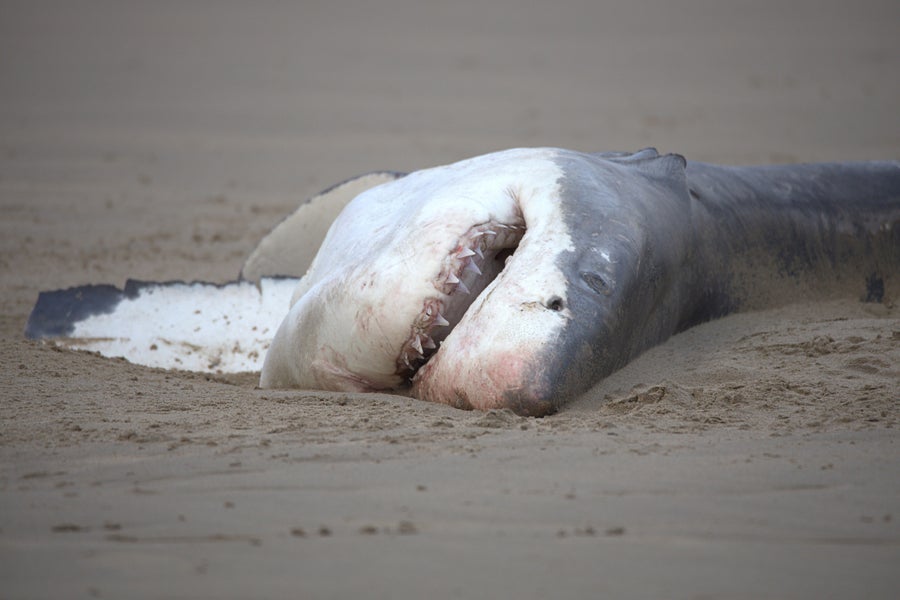
A great white shark carcass.
Credit: Christiaan Stopforth, Drone Fanatics SA ( CC BY )
The slick suggested that the orcas had attacked and killed something. The boat followed the animals, which were swimming apart from each other. Suddenly a great white shark appeared at the surface, with Starboard in hot pursuit. As researchers watched, the orca grabbed the shark’s left fin and thrust forward with its mouth, eviscerating the shark. Several minutes later, observers aboard a nearby shark-diving boat watched as Starboard swam a victory lap by their vessel, holding a bloody piece of shark liver in his mouth.
The shark killed in the attack was also known to biologists. “After 24 years of working with the great white, to see an orca—that, before [this], I loved a lot—killing my preferred shark, I was really stressed, is the minimum that I can say,” says Primo Micarelli, a marine biologist at the University of Siena in Italy who was on the shark-diving vessel. At the same time, he said, he knew the solo attack was unusual and important.
The vanquished shark was a juvenile about 2.5 meters (8.2 feet) long. The next day a slightly larger great white shark measuring 3.55 meters (11.6 feet) long washed ashore nearby, also liverless. This shark may have been the one killed in the first, unobserved attack that left the gory slick, the researchers wrote in their paper.
Port and Starboard are a “gift that keeps on giving,” says Isabella Reeves, a doctoral candidate in marine biology at Flinders University in Australia, who has collaborated with Towner but was not involved in the current research. The whales are rewriting some of what biologists thought they knew about orcas, she says. “I think perhaps what surprises me most is that there seems to be some degree of ‘leadership’ from these two male killer whales during these hunts, which is unusual and not recorded much in the wild,” she says. “Females generally take the lead while hunting.”
Orcas in South Africa are not unique in their shark-hunting tendencies, says Jennifer Tennessen, a senior research scientist at the Center for Ecosystem Sentinels at the University of Washington. In the Pacific Northwest, offshore bands of orcas include a variety of sharks in their diets, she says. But these animals are found far off the coast of Oregon, Washington and British Columbia, so their behaviors are hard to observe, she says.
“There’s much to learn still about how many individuals are involved in these shark predations in South Africa and the frequency of these occurrences,” Towner says. “In fact, there is a whole lot we need to learn about killer whales in this part of the world in general. Most of them are difficult to access as they move at high speed and spend a lot of time away from the coasts. Citizen scientists and drones are contributing such valuable information.”
Editor’s Note (3/20/24): This article was edited after posting to correct the description of the killer whale’s attack being the first of its kind to be observed in detail. The text was previously amended on March 4 to correct the description of Alison Towner’s current position.
- Search Please fill out this field.
- Manage Your Subscription
- Give a Gift Subscription
- Sweepstakes
Orca Whale Spotted Killing Great White Shark in Under 2 Minutes in 'Unprecedented' Attack
Scientists say the implications of a killer whale hunting solo, rather than in a group, could be huge for the local ecosystem
Charlotte Phillipp is a Weekend Writer-Reporter at PEOPLE. She has been working at PEOPLE since 2024, and was previously an entertainment reporter at The Messenger.
:max_bytes(150000):strip_icc():format(webp)/P1110132copy-7df1eb396ec342e1a15d71e29dada6f1.jpg)
- Since at least 2017, scientists have observed two killer whales living near South Africa team up to attack and kill great white sharks
- In a recent article, scientists shared that they recently observed one of the orca whales in the shark-hunting pair kill a great white shark by itself in less than 2 minutes
- Experts believe this new hunting tactic could be a response to climate change and may have an impact on other ocean species
Scientists have observed an orca whale killing a great white shark alone off the coast of South Africa, and the attack could offer insights into how the whale species' hunting tactics have changed.
Since at least 2017 , a pair of orcas in the waters around South Africa have been killing great white sharks for their livers — a nutrient-dense meal for the whales — and leaving the rest of the sharks' bodies behind. The hunting tactic has been driving sharks away from the coastal waters around Cape Town, according to scientists studying the shark-hunting duo.
But this solo orca attack, observed by scientists in June 2023 and featured in an African Journal of Marine Science article published in March, showed one of the orcas killing an 8.2-foot-long shark by itself in under two minutes. According to one of the biologists who observed it, the ferocity of the attack was "unprecedented" and "astonishing."
Speaking with BBC , Rhodes University shark biologist Dr. Alison Towner told the outlet that the male orca, nicknamed Starboard, grabbed the young great white by its fin and "thrust forward several times before eventually eviscerating it" to get at its liver.
A newly released video of the attack shows Starboard quickly killing the shark before swimming away with the nutrient-rich liver in his mouth, passing by a nearby boat full of tourists.
According to the recent article about the shocking killer whale attack, this is the first widely observed occurrence of an orca hunting and killing a great white shark by itself.
This occurrence also challenges existing theories about the hunting strategies of killer whales, as previous research led scientists to believe that orcas primarily hunt in groups rather than by themselves. Previous killer whale attacks on the sharks involved multiple orcas — including Starboard’s partner, another male named Port — and took up to two hours, the researchers wrote.
Dr. Luke Rendell, another scientist from the University of St. Andrews in Scotland, told BBC that it was "unsurprising" that whales had learned to target great white sharks, as orcas may be facing challenges finding food due to issues like climate change and other human-led changes in their ecosystem.
"A great white shark is a nice, big concentration of food, so it's perhaps unsurprising that some populations [of orcas], where these sharks occur in sufficient numbers, have learned to exploit that," he said.
"Human activities, like climate change and industrial fishing, are exerting significant pressures on our oceans," Towner added.
The scientists behind the recent article on the solo killer whale attack first reported their findings about Port and Starboard in 2022. They wrote in the African Journal of Marine Science that they had traced at least 8 great white shark killings back to the pair. According to the researchers, several sharks had their hearts and livers removed.
Dr. Primo Micarelli, a biologist at Italy's Sharks Studies Centre and the University of Siena, told CNN in a statement that while seeing such a powerful attack was "unforgettable," he also worries about the ecological implications it has for both orcas and great white sharks.
"Despite my awe for these predators, I'm increasingly concerned about the coastal marine ecology balance," Micarelli told the outlet.
Never miss a story — sign up for PEOPLE's free daily newsletter to stay up-to-date on the best of what PEOPLE has to offer, from celebrity news to compelling human interest stories.
Orcas are the great white shark's only predator, aside from humans. Killer whales grow up to 30 feet in length and can weigh more than six tons, while great white sharks can reach up to 22 feet long and weigh around 2.5 tons.
Towner told BBC that the orcas' new hunting habits could impact other species, such as African penguins, which could face more danger from cape fur seals — as great white sharks usually hunt the seals.
"These are groundbreaking insights into the predatory behavior of this species," Towner told CNN. "The presence of these shark-hunting killer whales possibly ties into broader ecosystem dynamics. Rapid developments in this phenomenon make it challenging for science to keep pace."
Lone orca kills great white shark in never-before-seen incident, scientists say
For the first time ever, scientists witnessed a lone orca killing a great white shark off the coast of South Africa, further solidifying the mammal's reputation as the ocean's top predator and raising concerns about its impact on the area's ecosystem.
Researchers and tourists in Mossel Bay last June witnessed a killer whale named Starboard hunt an 8-foot great white shark, seizing it by the pectoral fin and "eventually eviscerating it," according to a study published this month in the African Journal of Marine Science . Scientists in a second vessel filmed the episode from a shark cage submerged in the water and recorded the whale "with a bloody piece of peach-colored liver in its mouth."
Dr. Alison Towner, a shark researcher at Rhodes University in Grahamstown, South Africa, is the lead author of the study. She and her colleagues have been researching interactions between killer whales and sharks in the region for several years.
Though researchers have recorded orcas in the area killing sharks in coordinated group attacks, "predation on a white shark by a lone killer whale has not been documented" before the June 2023 incident, the study says. "All other documented predation by killer whales on sharks in the region has involved 2–6 individuals."
Killer whales can be found in every ocean from the cold waters off Antarctica and Alaska to the coasts of northern South America and Africa, according to the National Oceanic and Atmospheric Administration. They are highly social mammals and spend the vast majority of their lives in groups called pods that can range from a just few whales to more than 20.
Except when they're forced to forage, the apex predators typically hunt in groups and work as a team to catch prey, which is what makes the incident notable, experts say. Towner, the main author of the study, said in a statement that the sighting was groundbreaking because it challenges the conventional hunting behaviors of killer whales known in the region.
“The astonishing predation ... represents unprecedented behavior underscoring the exceptional proficiency of the killer whale," Towner said.
The day after scientists witnessed the rare attack, a second white shark carcass washed ashore at Mossel Bay, according to the study. The recent incidents build on previous research that these killer whales predominantly target the livers of white sharks.
Josh McInnes, a researcher at the University of British Columbia, told USA TODAY the incident shows that killer whales not only are competing with white sharks for seals in the waters off South Africa but also that the mammals can develop niche tastes and independently overpower white sharks.
"This is kind of a rare situation," he said. "We don't see killer whales interacting with other large predators like white sharks very often."
Though more research is needed, McInnes and other experts say they're concerned killer whales could drive sharks away, as they have in other regions.
“The study raises critical questions about the impact of killer whale predation on shark populations in South Africa,” Towner said. “The displacement of various shark species due to killer whale presence may have implications for ... changes in the marine ecosystem.”
A single orca killed a great white shark in a shocking 2 minutes. This hunting behavior could mean problems for the fishing industry and tourism.
- A killer whale was observed hunting and eating the liver of a great white shark alone.
- Scientists said the event revealed new insights about the hunting proficiency of orcas.
- The ecosystem impacts of shark-hunting killer whales could affect commercial fishing and tourism.

Researchers observed a single killer whale slaying a great white shark and eating its liver , providing new insights about the hunting practice that could foreshadow potential problems for the fishing industry.
A paper published Friday in the African Journal of Marine Science detailed the event, which occurred in June 2023 off the coast of South Africa.
The research team watched as a male killer whale known as Starboard approached the juvenile white shark and "gripped the left pectoral fin of the shark and thrust forward with the shark several times before eventually eviscerating it," the study said, adding: "Remarkably, the period from seizing the shark by the pectoral fin to eviscerating it lasted less than 2 minutes."
Shortly after the attack, researchers on another boat captured photos of Starboard with "a bloody piece of peach-colored liver in its mouth," according to the paper.
Starboard has been observed killing white sharks in the past however, he usually hunts with a male companion named Port. The study said Port was present during the attack, but he kept his distance, and Starboard acted alone.
The orcas have been hunting white sharks and eating their livers off the coast of South Africa for years. Rare drone footage captured for Discovery Channel's Shark Week in 2022 showed killer whales preying on a white shark .
But the lone orca attack was a rarer phenomenon.
Related stories
"This sighting revealed evidence of solitary hunting by at least one killer whale, challenging conventional cooperative hunting behaviors known in the region," Alison Towner, lead author on the study and a doctoral researcher at Rhodes University, told CNN .
In a video post of the incident shared by the Earth Legacy Foundation , Towner said the predation "represents unprecedented behavior underscoring the exceptional proficiency of the killer whale."
Researchers say much is still unknown about the larger ecosystem implications of shark-hunting killer whales.
In 2022, another study published by the African Journal of Marine Science , for which Towner was also the lead author, suggested white sharks were fleeing a common aggregation site off South Africa because of the killer whales.
But scientists still don't know exactly where those white sharks are going.
"As they relocate, they might end up overlapping with heavy commercial fisheries," Towner told CNN.
A study published in October in the journal Ecological Indicators suggested that some of the white sharks migrated east of the area where they were being hunted by orcas.
The loss of white sharks in South Africa's waters could also impact tourism, as visitors from all over the world travel to the area to observe the predators.
"Over two decades of annual visits to South Africa, I've observed the profound impact these killer whales have on the local white shark population," Primo Micarelli, a marine biologist and an author on the paper, told CNN.
"Despite my awe for these predators, I'm increasingly concerned about the coastal marine ecology balance," he added.
Watch: Shark expert rates ten shark attack scenes in movies and tv
- Main content

Solitary killer whale devours shark in two minutes to defy group hunting habits
O rcas, also known as killer whales, are renowned for working in groups. Together they attack sea lions, seals and in recent times even sailboats and private yachts . However, teamwork is not for Starboard, who prefers to act alone. This is the first killer whale in history that has been observed individually hunting a great white shark and devouring it in just two minutes. The staggering predation was captured by a group of scientists off the coast of Mossel Bay (South Africa) and marks an unprecedented behavior that highlights the killer whales’ remarkable dexterity and super-predatory abilities. The findings were published in the African Journal of Marine Science on Friday.
The marine biologist, Alison Towner of Bangor University (Wales, UK) is a great white shark specialist in the region. Thanks to her monitoring of these large predators, together with her team she managed to identify that since 2017 a pair of killer whales hunted and killed sharks off the coast of South Africa, driving large numbers out of their natural settlement spots. They published their findings in the same journal in 2022 and kept documenting the behavior, until they came across the orca Starboard, whose name is derived from a wound on a dorsal fin. The team observed that Starboard acted alone and managed to incapacitate and consume a 2.5-meter shark in a remarkable two minutes. “The moment when Starboard swiftly hunted down my favorite species of shark was both devastating and powerful,” explains Towner. In these interactions, at least two other sharks were killed by orca attacks, as evidenced by the nearby discovery of a second 3.5-meter carcass.
By hunting together, killer whales can circle prey and use their collective intelligence and brawn to attack. Though they can tackle large animals individually, this is the first case involving one of the world’s largest predators . The adroitness with which Starboard devoured the shark suggests remarkable skills, as the research team found that killer whales are showing a strong preference for extracting and consuming livers, which are rich in lipids. This remarkable discovery has been described as specialized feeding behavior. “The observations add more layers to the fascinating story of killer whales and their capabilities as intelligent predators,” says Towner. Although she concedes that it cannot be speculated that this signals a change in hunting strategy, she does believe that it is likely to be a technique previously used. “Killer whales can quickly learn new hunting techniques on their own or from others,” she adds.
Paul Tixier, a marine biologist at the University of Victoria in Canada, says that great white sharks in this region have a low-risk perception of orcas because hunting them is “novel behavior.” These dynamics could lead to selection pressures if sharks continue to perceive killer whales as a low risk. Great white sharks are classified as a vulnerable species on the International Union for Conservation of Nature (IUCN) Red List.
Despite the startling discovery, the occurrence has also raised concerns among experts. The finding, they explain, raises critical questions about the impact and ecological repercussions that predation by killer whales may have on shark populations in the region. “The decline of sharks in the oceans causes cascading impacts on marine ecosystems due to an imbalance in predators,” explains the author. For this reason, they believe it is essential to understand the ecological dynamics for marine conservation efforts.
Specialists point to the need for further research on the causes, but suggest human pressures as a possible cause of the orcas’ displacement. Especially for activities such as hunting and fishing. “Great white sharks are displaced and survival and relocation patterns carry potential risks, such as the overlap with fishing or human encounters in remote coastal areas further east,” Towner points out. This species serves as an important biological flux of nutrients between ecosystems, and therefore abandonment of an area or reduced foraging success can have long-term consequences on the nutrient cycle.
Esther Jacobs, of the marine conservation initiative Keep Fin Alive, acknowledges that while she was astonished to see the predation, she was also concerned about the “profound impact” it could have on the marine ecology. Both the author and Jacobs suggest that given the scenario of changing environmental conditions, constant ecological monitoring is essential to establish adaptive conservation strategies. “Collaboration with shore-based observers, boat-based tourists and various organizations played a critical role in capturing crucial data and video recordings of predation occurrences and might also be critical in conservation efforts.”
They conclude that more research is required to better understand the long-term implications of these interactions between killer whales and great white sharks. Tixier points out that a key strategy is to determine the total number of killer whales feeding on great white sharks and whether they all belong to the same population or to several ones. “Despite my admiration for these predators, I am more and more concerned about the marine ecological balance,” admits Jacobs.
Sign up for our weekly newsletter to get more English-language news coverage from EL PAÍS USA Edition
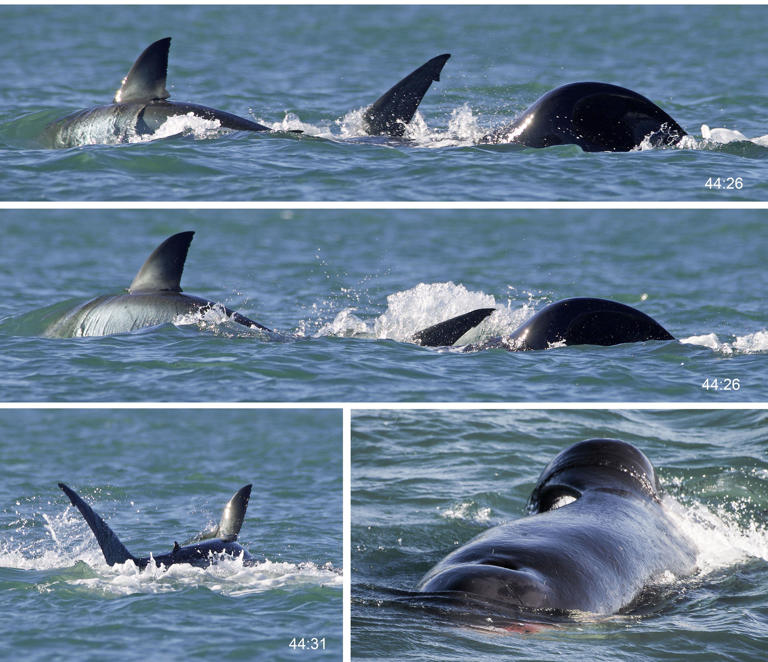

IMAGES
COMMENTS
Recent boat attacks might be driven by trauma. Killer whales are pictured during a storm in the fjord of Skjervoy in 2021 off the coast of northern Norway. Researchers say orcas are stepping up ...
Ramon Padilla. After four years and hundreds of incidents, researchers remain puzzled why orcas, also known as killer whales, continue to ram boats - sinking a few of them - along the Iberian ...
A trio of orcas attacked a boat in the Strait of Gibraltar earlier this month, damaging it so badly that it sank soon afterward. The May 4 incident was the third time killer whales (Orcinus orca ...
Orcas attack boats off coast of Spain and Portugal, ... Killer whales are 'attacking' sailboats near Europe's coast. Scientists don't know why. August 20, 2022 8:49 AM ET. By . Scott Neuman
Orcas may be teaching others to attack boats following a spate of strikes on sailboats off the coast of Europe, some observers say. Sailors have reported a series of "coordinated" attacks by a ...
A boat captain who was attacked twice by orcas, once in 2020 and once in 2022, told Newsweek that the whales seemed to have a plan. "First time, we could hear them communicating under the boat ...
A string of incidents since 2020 prompted one scientist to say the attacks may indicate that the whales are intending to cause damage to sailing vessels. Others are more skeptical.
Why orcas are coordinating attacks against sailboats. The common denominator in dozens of incidents appears to be a mature female named White Gladis. A group of orcas (killer whales) work together ...
On 30 August, a French-flagged vessel radioed the coastguard to say it was "under attack" from killer whales. Later that day, a Spanish naval yacht, Mirfak , lost part of its rudder after an ...
Killer whales severely damaged a sailing boat off the coast of southern Spain, the local maritime rescue service said on Thursday, adding to dozens of orca attacks on vessels recorded so far this ...
Three orcas (Orcinus orca), also known as killer whales, struck the yacht on the night of May 4 in the Strait of Gibraltar, off the coast of Spain, and pierced the rudder."There were two smaller ...
A pod of orcas in southwestern Europe sank a sailing boat on Oct. 31 after a non-stop, 45-minute attack, Live Science reported . The incident is the fourth occurrence in two years where orcas ...
01:17 - Source: CNN. CNN —. When Daniel Kriz saw a pair of killer whales underneath his boat while crossing the Strait of Gibraltar in April, he thought: "Not again.". For Kriz, a veteran ...
On Oct. 31, a pod of killer whales swarmed a Polish yacht sailing in the Strait of Gibraltar. For 45 minutes, the orcas hit the vessel's rudder and damaged the boat, according to the company ...
"Interactions with killer whales have affected, above all, medium-sized sailboats, with a length equal to or less than 15 meters (49 feet)," a statement from the ministry said.
Experts doubt it's revenge. An unusually large group of killer whales was spotted off the coast of San Francisco on May 7. The attacks started suddenly and inexplicably in the spring of 2020 ...
0:47. Lately, all the news outlets are reporting about killer whales attacking sailboats off the Iberian coast near the Strait of Gibraltar, where the Atlantic Ocean meets the Mediterranean Sea ...
A group of orcas managed to sink a yacht off the coast of Morocco last week, after its 45-minute attack on the vessel caused irreparable damage, a Polish tour company said. The incident happened ...
10 min. From spinning boats to breaking rudders, a group of feisty orcas has been causing chaos off the coast of Spain. In the past few years, boaters have reported more than 500 interactions with ...
Here's what they recommend if an orca approaches your boat: Advertisement. "Disconnect autopilot to avoid damage and let the wheel/tiller run free. Keep hands away from wheel or tiller to avoid ...
Orca attacks on boats appear to be 'leapfrogging' across oceans as a yacht is rammed by killer whale north of Scotland. Orcas in Norway. An orca repeatedly rammed a yacht in the Shetland Islands ...
Incredible video of killer whales seen attacking small and large boats off the coast of Spain.There's been an increase in these encounters and some wonder wh...
"Sperm whales are considered an apex predator, and historically, it was thought that they were pretty much immune to killer whale attacks," Ms Tucker said. Mother and baby sperm whale swimming ...
The killer whale involved is well known in Mossel Bay, South Africa. Dubbed "Starboard" for his bent-to-the-right dorsal fin, this orca has been observed preying on white sharks in the area ...
Killer Whales Sink Boat Off Morocco in 45-Minute Attack: 'Love of the Sea Always Wins' The scientists behind the recent article on the solo killer whale attack first reported their findings about ...
A killer whale known as Starboard preys on a great white shark in June off the South African coast, pushing it through the water while gripping its pectoral fin. Christiaan Stopforth/Drone Fanatics SA
Researchers and tourists in Mossel Bay last June witnessed a killer whale named Starboard hunt an 8-foot great white shark, seizing it by the pectoral fin and "eventually eviscerating it ...
A killer whale was observed hunting and eating the liver of a great white shark alone. ... Shortly after the attack, researchers on another boat captured photos of Starboard with "a bloody piece ...
The attack - filmed in 2023, which you can watch here - was, scientists, said "solo and swift". The male killer whale killed the shark and consumed its liver - all in under two minutes.
Orcas, also known as killer whales, are renowned for working in groups. Together they attack sea lions, seals and in recent times even sailboats and private yachts. However, teamwork is not for ...